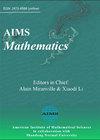平面刚柔多体系统约束雅可比矩阵的建立框架
IF 1.8
3区 数学
Q1 MATHEMATICS
引用次数: 0
摘要
约束违例修正是求解多体系统动力学的一个重要研究课题。多体系统动力学方法以递归方式推导加速度方程,避免求解整体动力学方程,因此快速准确地求解违例问题至关重要。直接校正法因其简单、精度高、计算成本低而受到青睐。该方法直接补充约束方程并进行修正,是解决违反问题的有效方法。然而,使用动力学方程计算该方法的重要雅可比矩阵可能具有挑战性,特别是对于复杂的多体系统。本文提出了平面刚柔多体系统雅可比矩阵沿二次关节分离的两条路径以简单半解析形式推导的程序框架。通过数值算例,比较了在进行约束违背修正和不进行约束违背修正时的约束违背误差,验证了该方法的有效性。并与直接微分解的计算速度进行了比较,验证了该方法的有效性。这种简单、可编程性强、通用性强的方法为大型动力学软件的编程提供了新的思路,并扩展了以推导加速度方程为重点的动力学方法的应用。本文章由计算机程序翻译,如有差异,请以英文原文为准。
A framework for establishing constraint Jacobian matrices of planar rigid-flexible-multibody systems
Constraint violation correction is an important research topic in solving multibody system dynamics. For a multibody system dynamics method which derives acceleration equations in a recursive manner and avoids overall dynamics equations, a fast and accurate solution to the violation problem is paramount. The direct correction method is favored due to its simplicity, high accuracy and low computational cost. This method directly supplements the constraint equations and performs corrections, making it an effective solution for addressing violation problems. However, calculating the significant Jacobian matrices for this method using dynamics equations can be challenging, especially for complex multibody systems. This paper presents a programmatic framework for deriving Jacobian matrices of planar rigid-flexible-multibody systems in a simple semi-analytic form along two paths separated by a secondary joint. The approach is verified by comparing constraint violation errors with and without the constraint violation correction in numerical examples. Moreover, the proposed method's computational speed is compared with that of the direct differential solution, verifying its efficiency. The straightforward, highly programmable and universal approach provides a new idea for programming large-scale dynamics software and extends the application of dynamics methods focused on deriving acceleration equations.
求助全文
通过发布文献求助,成功后即可免费获取论文全文。
去求助
来源期刊

AIMS Mathematics
Mathematics-General Mathematics
CiteScore
3.40
自引率
13.60%
发文量
769
审稿时长
90 days
期刊介绍:
AIMS Mathematics is an international Open Access journal devoted to publishing peer-reviewed, high quality, original papers in all fields of mathematics. We publish the following article types: original research articles, reviews, editorials, letters, and conference reports.
 求助内容:
求助内容: 应助结果提醒方式:
应助结果提醒方式:


